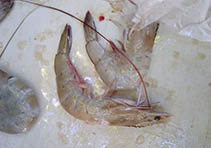Penaeus vannamei Boone, 1931
Whiteleg shrimp
Classification / Names Common names | Synonyms | CoL | ITIS | WoRMS
Malacostraca | Decapoda | Penaeidae
Environment: milieu / climate zone / depth range / distribution range Ecology
Benthic; brackish; depth range 0 - 72 m (Ref. 8). Subtropical, preferred 26°C (Ref. 107945); 35°N - 20°S (Ref. 356)
Distribution Countries | FAO areas | Ecosystems | Occurrences | Introductions
Pacific Ocean: from Mexico to southern Peru.
Length at first maturity / Size / Weight / Age
Maturity: Lm ? range ? - ? cm Max length : 23.0 cm TL male/unsexed; (Ref. 8)
Life cycle and mating behavior Maturity | Reproduction | Spawning | Eggs | Fecundity | Larvae
Main reference
References | Coordinator | Collaborators
Holthuis, L.B. 1980 FAO Species Catalogue. Vol. 1. Shrimps and prawns of the world. An annotated catalogue of species of interest to fisheries. FAO Fish. Synop. 125(1):271 p. Rome: FAO. (Ref. 8)
IUCN Red List Status
(Ref. 130435: Version 2025-1)
CITES status (Ref. 108899)
CMS (Ref. 116361)
Threat to humans
Human uses
Fisheries: commercial
FAO - Aquaculture: production, species profile; Fisheries: landings, species profile | FishSource | Sea Around Us
Tools
More information
Diet composition
Food consumption
Predators
Max. ages / sizes
Length-weight rel.
Length-length rel.
Length-frequencies
Mass conversion
Abundance
Internet sources
BHL | BOLD Systems | CISTI | DiscoverLife | FAO(Aquaculture: species profile; Fisheries: species profile; publication : search) | Fishipedia | GenBank (genome, nucleotide) | GloBI | Gomexsi | Google Books | Google Scholar | Google | PubMed | Tree of Life | Wikipedia (Go, Search) | Zoological Record



